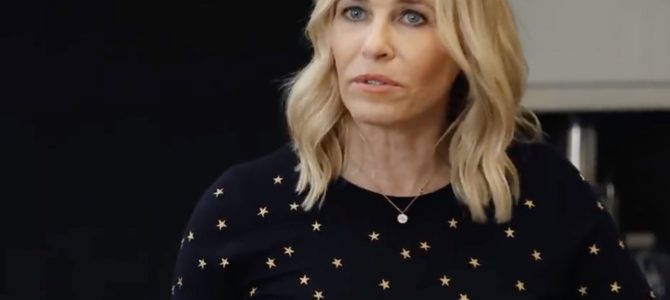
Two years after the cancellation of her talk show, Chelsea Handler is back on Netflix, this time delivering a documentary-style dive into the concept of white privilege. “Hello Privilege, It’s Me Chelsea” dropped on Friday the Thirteenth, promising to explore how white privilege has benefited Handler’s life.
When Chelsea first introduced her fans to the project on Instagram—taking a break from her usual marijuana smoke-filled cooking escapades—it seemed puzzling. Handler is, after all, the stand-up comedienne who penned the book “Uganda Be Kidding Me” and released a comedy special by the same name just five years ago.
“Hello Privilege, It’s Me Chelsea” sees Handler employ an attitude familiar to her fans: perhaps a bit unwitting but still earnestly inquisitive. “I thought I deserved everything,” she says. “I’m clearly the beneficiary of white privilege [so] I want to know what my personal responsibility is moving forward in the world that we live in today.”
One of Chelsea’s first stops in her noble quest to be a better white person is an open mic night hosted by Jody Armour, a law professor at the University of Southern California. Handler is unceremoniously called on for privilege by the woke crowd assembled at the event. “I’m like really embarrassed to be here with you,” says one open mic participant. “This is just another example of white privilege…what are you going to do with it rather than come into this space and take?”
It’s a worthy question. A successful white woman invading this group’s space with a camera crew in tow to get soundbites for a documentary on Netflix is an act of exploitation—or so the woke crowd would argue. “That was intense,” Chelsea says of her less than warm welcome to a supposedly open forum.
When Chelsea heads to an Oktoberfest event in Helen, Georgia to “talk to a bunch of white racists,” she finds tipsy southerners who just don’t buy into the idea of white privilege. Not exactly the bigoted confab she was expecting.
She speaks with a group of conservative women in Orange County, California. They too reject the left’s notion of white privilege, pointing to its damaging impact on free expression (“If you’re white, shut up”) and mentions every individual encounters advantages and disadvantages in life. “I didn’t get anywhere by being white or having a privilege. I got there because I worked my ass off,” one notes. “I can respect that,” Chelsea responds.
In conversations with academics, activists, historians, and fellow celebrities, Handler elicits a series of definitions and effects of white privilege: “It’s a white person problem that has consequences for people of color,” offers one activist. “It’s the flip side of oppression—if some people are down, by definition, other people have to be up.” By this definition, Handler’s in a tough spot—her various TV projects, multiple bestselling books, and ritzy L.A. digs are a lot of “up” that must be holding down a whole community of oppressed people.
Who, instead of herself, does Chelsea choose to portray as those responsible for keeping others down? Ben Shapiro, Tucker Carlson, and Jesse Watters, of course. A series of clips flash through Shapiro delivering a campus lecture for Young America’s Foundation at Yale University, then Carlson and Watters discussing white privilege on their respective Fox News shows. All three clips feature the conservative commentators casting doubt on the concept of white privilege. For their words, Chelsea makes them the villains of her documentary.
The common thread running throughout the film is the conflation of white privilege with institutional racism, the latter of which many interviewees argue is still a significant problem in America. From incarceration rates to voter turnout and education funding disparities to income inequality, white privilege is blamed. Yet no balm for the scourge of privilege is provided. Instead, it’s a demonization of Chelsea and her fellow white Americans.
Among those whose voice Chelsea elevates is Melina Abdullah, a faculty member at California State University, Los Angeles, and co-founder of Black Lives Matter. Abdullah, not exactly open for conversation, has a track record of silencing dissent. Back in 2016 she was one of the faculty leaders who whipped students into an angry mob and physically barred entrance to a YAF lecture with Shapiro at Cal State LA. “I don’t want to talk to white people,” Abdullah tells Chelsea, referencing “white tears.” “I don’t want to have to hold you because you’re seeing your white supremacy.”
“Until doing this film, I didn’t realize all the things that I’m guilty of that I’ve never been arrested for, that black people do get arrested for,” Chelsea realizes after going back to visit her ex-boyfriend, by whom she was pregnant twice, and who did 14 years behind bars for armed robbery.
“I thought I was killing it, and here I am in Bel Air, living the high life, thinking I’m diverse and I’m open-minded and multicultural. I don’t even know why I think I’m multicultural,” she says.
Many like Chelsea assume that because they say “Black lives matter” and tweet their support for marginalized classes, they earn status as an ally. These individuals are usually spared the worst of the left’s bullying because they’re sort-of woke. When they actually come face to face with the intolerant trend-setters of the left—those who determine leftist orthodoxy and punish those who stray from its narrow guidelines—Chelsea and others find they don’t always receive the hero’s welcome they feel entitled to.









